Transform your outdoor space with thoughtfully designed stone walkways that blend functionality with natural beauty. These pathways serve as both practical routes through your landscape and stunning design elements that enhance your home's curb appeal. From traditional flagstone arrangements to contemporary geometric patterns, stone walkways offer endless possibilities for creating welcoming entrances and garden paths. Each material brings unique characteristics—whether you choose the classic elegance of limestone, the rustic charm of river rock, or the modern appeal of slate. The right stone walkway design reflects your personal style while complementing your home's architecture and surrounding landscape features.

1. Flagstone Patio Walkway with Natural Joints
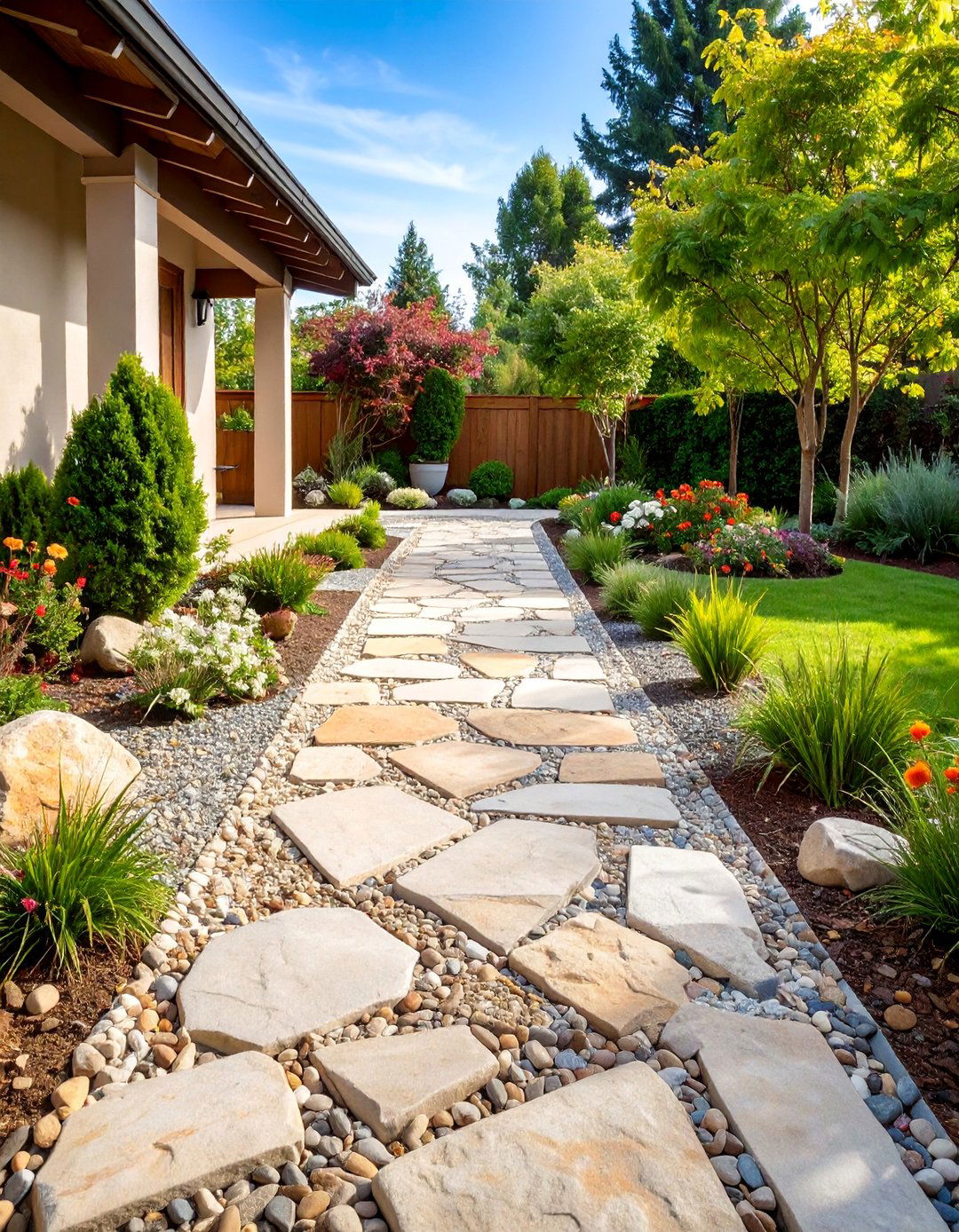
Flagstone remains the quintessential choice for creating timeless stone walkways that exude natural elegance. This classic approach uses large, irregularly shaped flagstone pieces in warm earth tones, laid with natural spacing that allows for organic joint patterns. The stones are typically installed over a sand base with decomposed granite or pebble filling between joints, creating excellent drainage while maintaining stability. This design works exceptionally well for front entrances and garden paths, as the varied stone shapes create visual interest without overwhelming the landscape. The natural texture provides safe, non-slip surfaces even when wet, making it ideal for year-round use in various climates.
2. River Rock Mosaic Garden Path
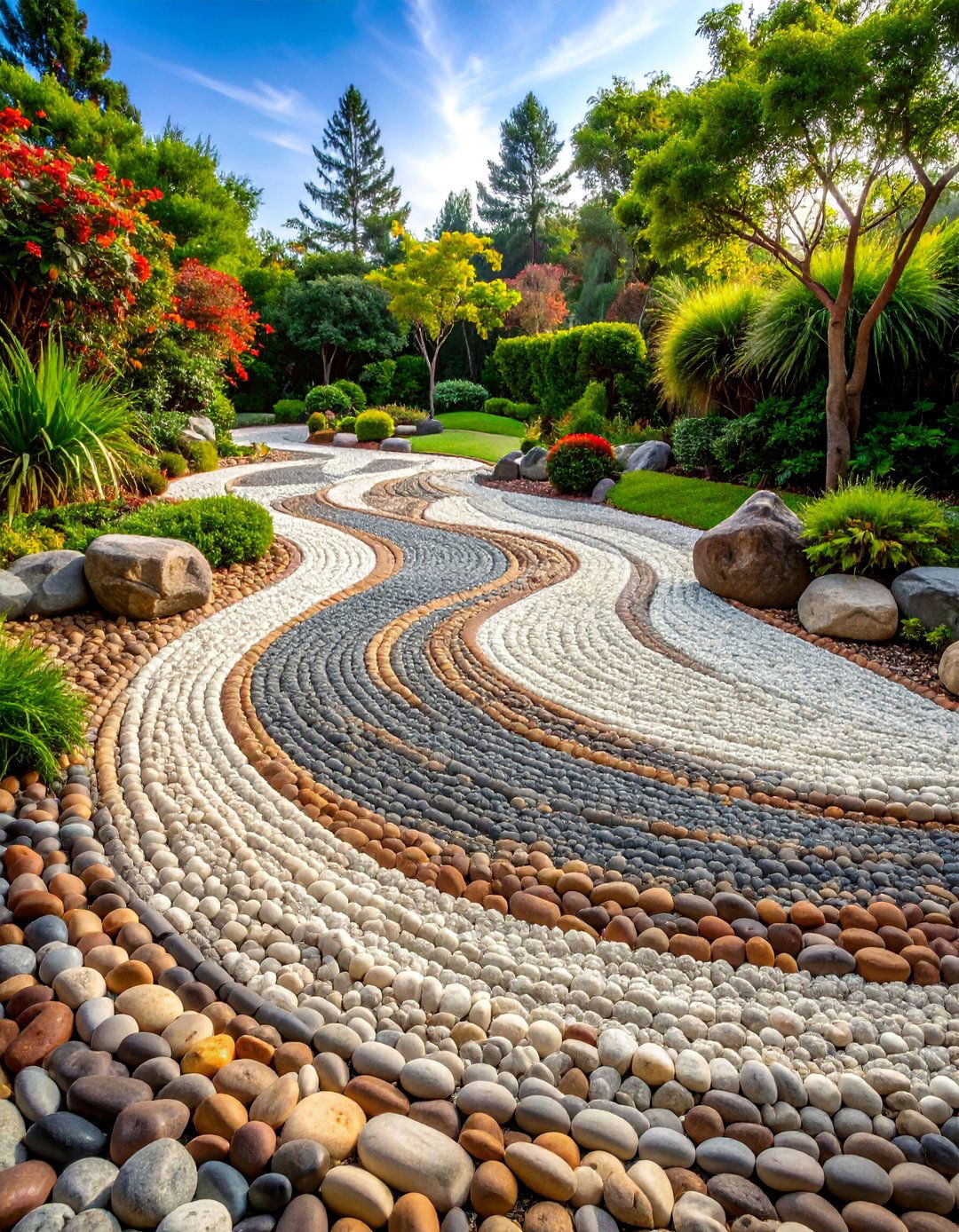
Create an enchanting walkway using smooth river rocks arranged in flowing mosaic patterns that mimic natural water movement. This design combines different sizes of river rocks—from large accent stones to smaller pebbles—arranged in swirling patterns or geometric designs set in concrete or sand base. The naturally rounded edges and varied colors of river rocks create a tactile, meditative walking experience perfect for zen gardens or naturalistic landscapes. Installation involves careful placement of each stone to achieve the desired pattern, with smaller pebbles filling gaps between larger stones. The finished path offers excellent drainage and requires minimal maintenance while providing a unique artistic element.
3. Slate Stepping Stone Contemporary Design

Modern slate stepping stones deliver sleek sophistication with their clean lines and contemporary appeal. This design features precisely cut rectangular or square slate pieces with consistent spacing, creating a minimalist pathway that complements modern architecture. The dark gray to charcoal coloring of slate provides striking contrast against green lawns or light-colored gravel infill. Each stepping stone is set at comfortable walking intervals, typically eighteen to twenty-four inches apart, allowing grass or ground cover to grow between stones. The smooth, flat surface of slate ensures safe footing while the geometric arrangement adds structural beauty that enhances contemporary landscape designs and urban garden settings.
4. Cobblestone Herringbone Entrance Walkway
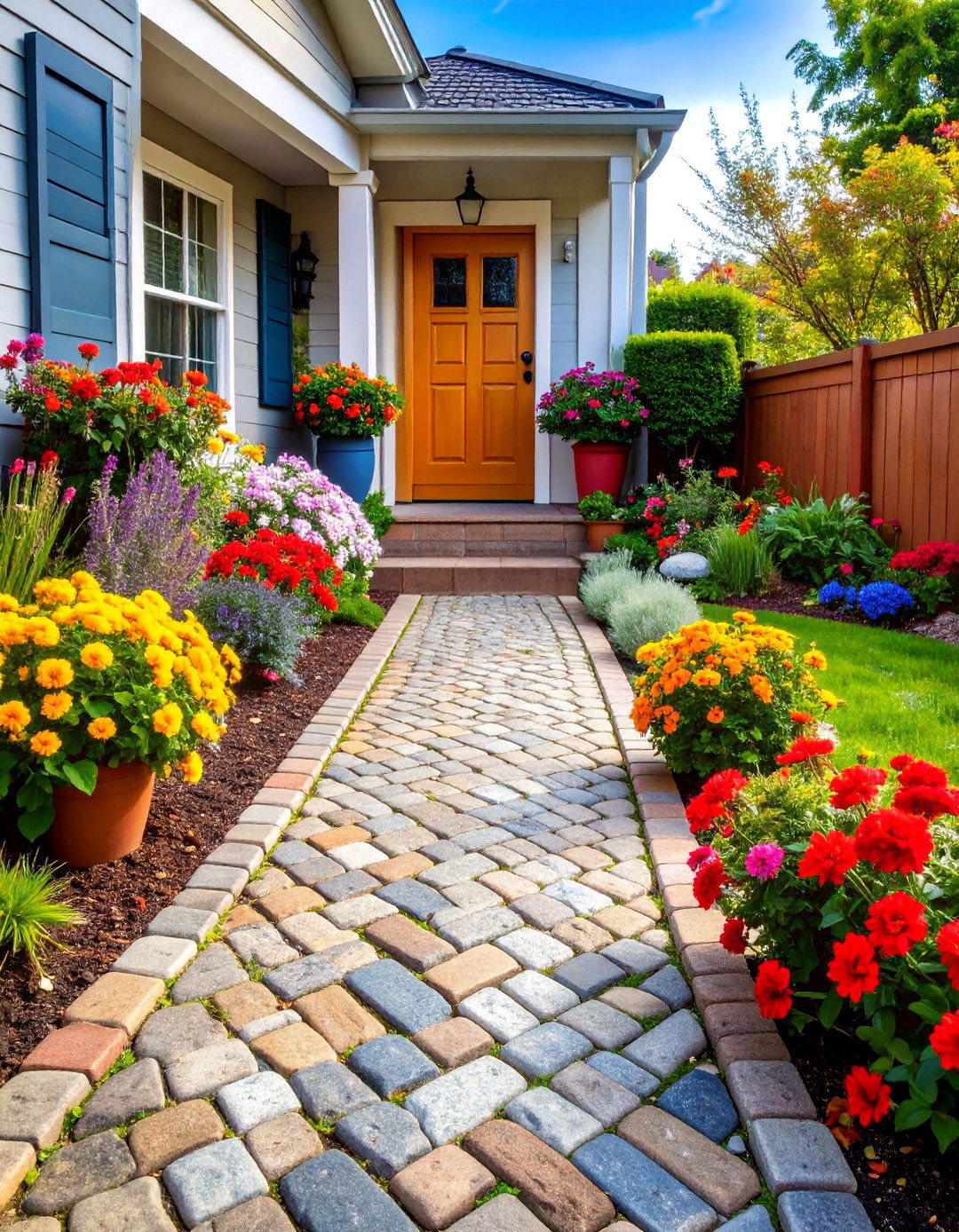
Traditional cobblestone arranged in classic herringbone patterns creates an entrance walkway with old-world charm and lasting durability. This formal design uses uniformly sized cobblestones laid in interlocking V-shaped patterns that direct the eye toward your front entrance. The herringbone pattern provides excellent structural integrity while creating visual movement that makes pathways appear wider and more impressive. Installation requires careful attention to spacing and alignment, typically using sand base with polymeric sand joints for stability. This design pairs beautifully with historic homes, colonial architecture, and formal garden settings where traditional craftsmanship and enduring elegance are desired.
5. Limestone Ashlar Pattern Formal Path
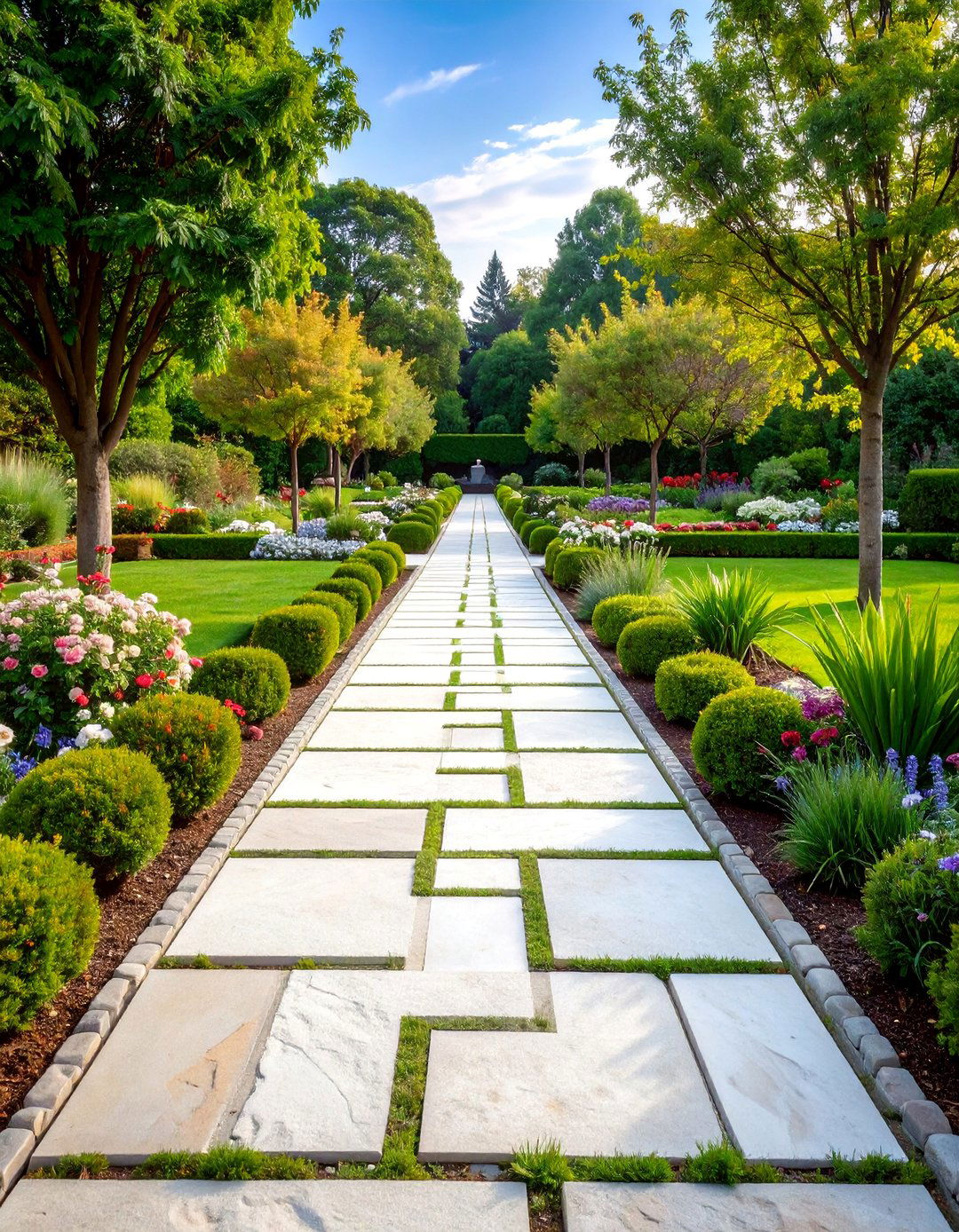
Sophisticated limestone walkways featuring ashlar patterns bring architectural elegance to formal landscape designs. This refined approach uses precisely cut limestone blocks in rectangular shapes arranged in structured patterns that emphasize order and symmetry. The light, neutral tones of limestone create bright, welcoming pathways that reflect natural light beautifully throughout the day. The ashlar pattern, with its alternating block sizes and perfect joints, requires skilled installation but delivers unmatched formal beauty. This design works exceptionally well for grand entrances, connecting patios to gardens, and creating transitions between different outdoor living spaces where architectural continuity is important.
6. Sandstone Irregular Path with Plantings
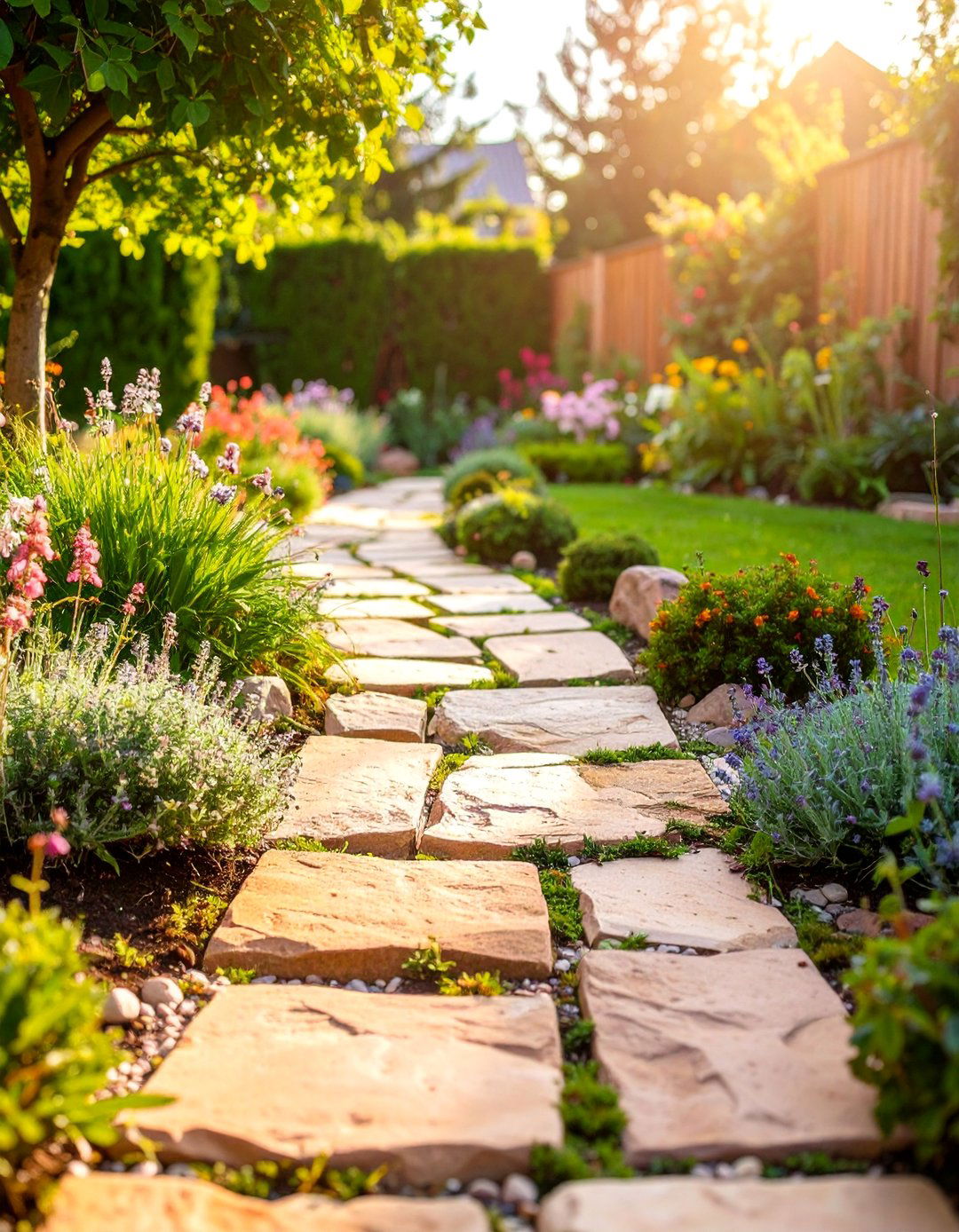
Natural sandstone arranged in irregular patterns with integrated plantings creates charming cottage-style walkways. This organic design uses various sizes of sandstone pieces with generous spacing that accommodates low-growing plants like creeping thyme, moss, or small sedums between stones. The warm, earth-toned colors of sandstone blend seamlessly with garden settings while the irregular arrangement feels natural and inviting. Plants growing between stones soften the hardscape elements and provide seasonal color changes. Installation involves setting stones at slightly different levels to create natural stepping rhythm while ensuring adequate soil depth for plant growth between stones.
7. Granite Slab Modern Linear Walkway

Contemporary granite slab walkways offer sleek, minimalist design with exceptional durability and modern appeal. This design features large, rectangular granite pieces arranged in clean linear patterns that emphasize geometric precision and contemporary aesthetics. The speckled surface texture of granite provides subtle visual interest while maintaining sophisticated simplicity. Large slabs create fewer joints, resulting in smooth, uninterrupted walking surfaces perfect for modern homes and urban landscapes. The natural strength of granite ensures long-lasting performance in high-traffic areas, while its resistance to weathering maintains consistent appearance year-round. Professional installation ensures proper leveling and spacing for optimal visual impact.
8. Bluestone Circular Pattern Focal Point

Distinctive bluestone arranged in circular or radiating patterns creates stunning focal points within garden walkways. This artistic design uses bluestone's natural blue-gray coloring and fine texture to form concentric circles, spirals, or radiating patterns that draw attention and create gathering spaces. The circular arrangement can mark entrances, highlight garden features, or create rest areas along longer pathways. Installation requires careful measurement and cutting to achieve precise curves and consistent spacing. This design works beautifully in formal gardens, meditation spaces, and areas where architectural interest is desired. The subtle color variations in bluestone add depth while maintaining overall design cohesion.
9. Travertine Tumbled Mediterranean Style

Warm travertine stones with tumbled edges create Mediterranean-inspired walkways that evoke luxury resort aesthetics. This design uses travertine's naturally porous texture and cream to gold coloring to establish elegant, resort-style pathways. The tumbled finish provides slightly rounded edges that feel comfortable underfoot while creating subtle shadow lines that add visual depth. Travertine's thermal properties keep surfaces relatively cool even in direct sunlight, making it ideal for pool areas and sunny exposures. Installation typically uses sand-set or mortar methods depending on traffic requirements. This design pairs beautifully with stucco homes, outdoor kitchens, and landscapes featuring Mediterranean plants.
10. Pea Gravel Border Stone Combination
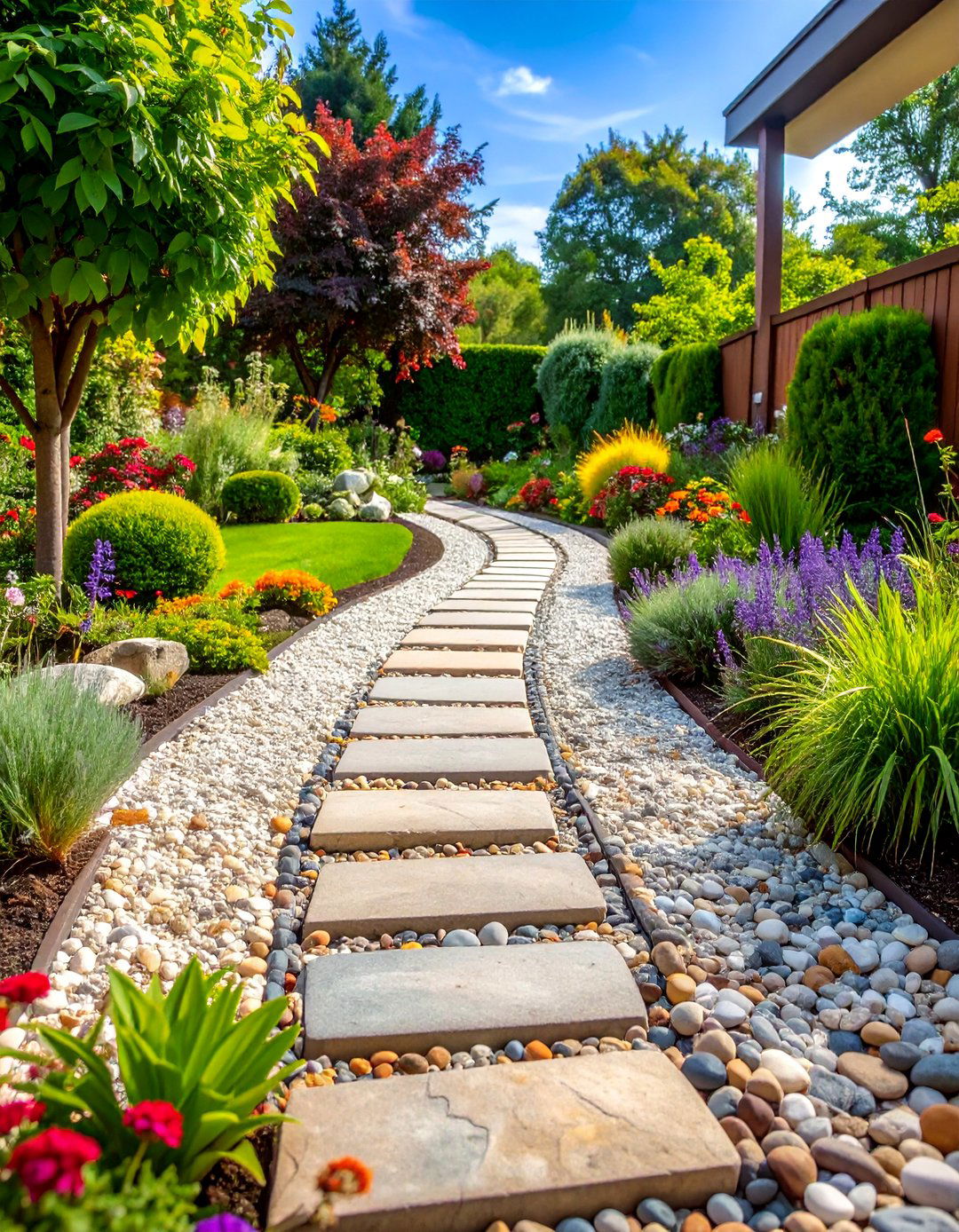
Combining stepping stones with pea gravel borders creates budget-friendly walkways with professional appearance and excellent drainage. This practical design uses larger stone elements for primary walking surfaces while pea gravel fills surrounding areas and provides transitional borders. The contrast between solid stones and loose gravel creates visual interest while maintaining functionality. Pea gravel comes in various colors, allowing customization to complement chosen stone materials and surrounding landscape elements. Installation involves setting primary stones first, then adding gravel to desired depth with appropriate edging to contain materials. This approach works well for informal gardens, side yards, and areas requiring flexible, permeable surface solutions.
11. Quartzite Geometric Pattern Walkway

Durable quartzite stones arranged in precise geometric patterns deliver contemporary sophistication with exceptional longevity. This modern design emphasizes angular shapes, clean lines, and repetitive patterns that create visual rhythm and structural beauty. Quartzite's natural sparkle and varied coloring add subtle elegance while maintaining geometric precision. The extreme hardness of quartzite ensures resistance to wear, making it perfect for high-traffic areas and climates with freeze-thaw cycles. Installation requires professional cutting and fitting to achieve perfect geometric alignment. This design complements modern architecture, urban landscapes, and outdoor spaces where durable, low-maintenance beauty is prioritized over rustic natural appearance.
12. Mixed Stone Mosaic Artistic Path

Creative combinations of different stone types create unique mosaic walkways that function as outdoor art installations. This artistic approach mixes materials like slate, granite, limestone, and river rock in planned patterns or random arrangements that showcase natural stone diversity. Different textures, colors, and sizes create visual richness while maintaining practical walking surfaces. Design possibilities range from subtle color gradations to bold contrasts that make dramatic statements. Installation requires careful planning to ensure compatibility between different stone types and proper substrate preparation for varying thicknesses. This design works beautifully in creative gardens, artistic landscapes, and outdoor spaces where personal expression is valued.
13. Fieldstone Natural Woodland Path
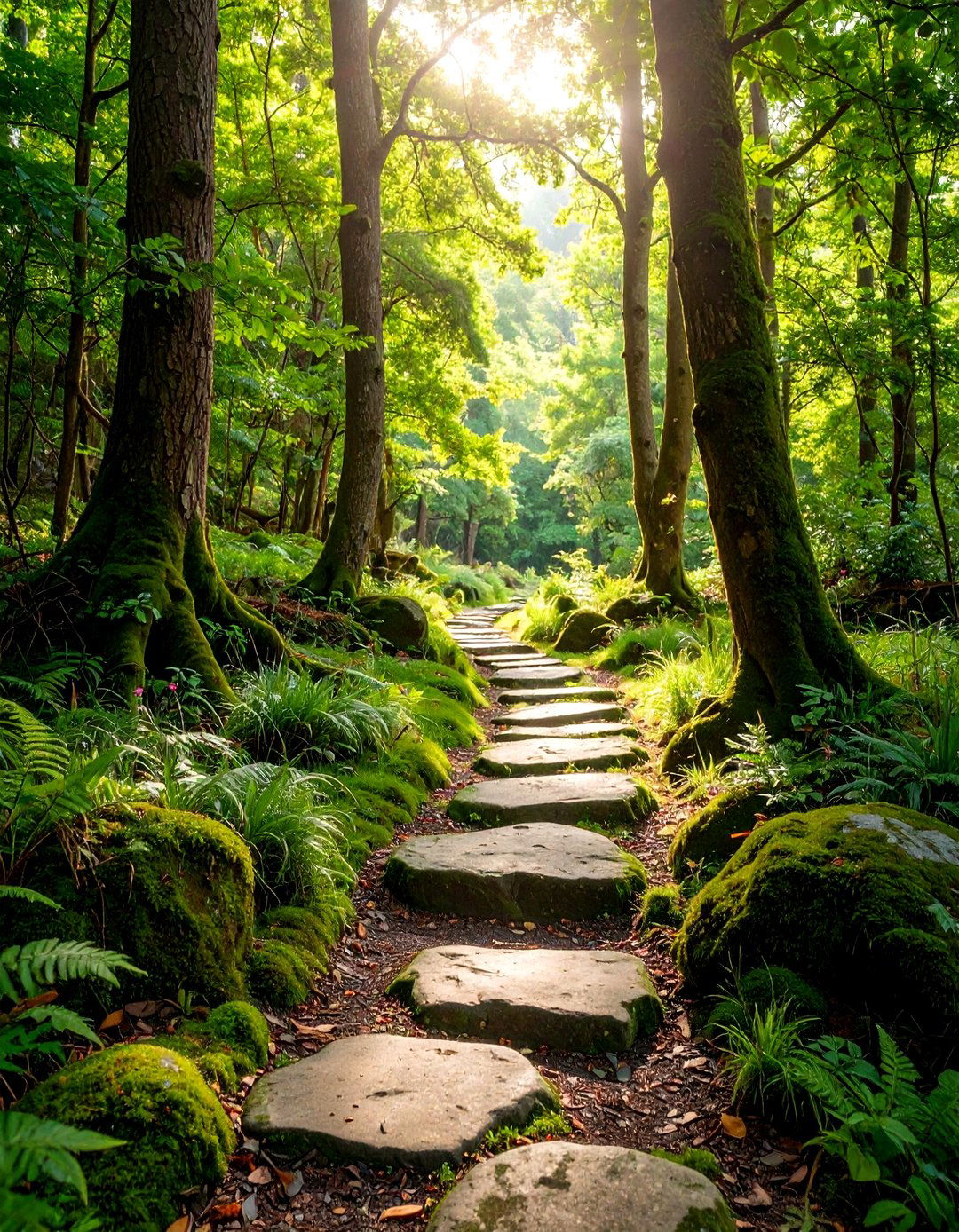
Locally sourced fieldstones create authentic woodland pathways that blend seamlessly with natural forest settings. This rustic design uses stones found on-site or regionally sourced materials that match local geological characteristics. Irregular shapes and natural weathering patterns create pathways that appear as if they've existed for generations. The varied sizes and organic placement create comfortable walking rhythm while maintaining natural appearance. Installation involves minimal site preparation, working with existing topography and vegetation. This design particularly suits wooded properties, naturalistic gardens, and areas where environmental sensitivity and natural integration are priorities over formal landscape design.
14. Brick Border Stone Center Design
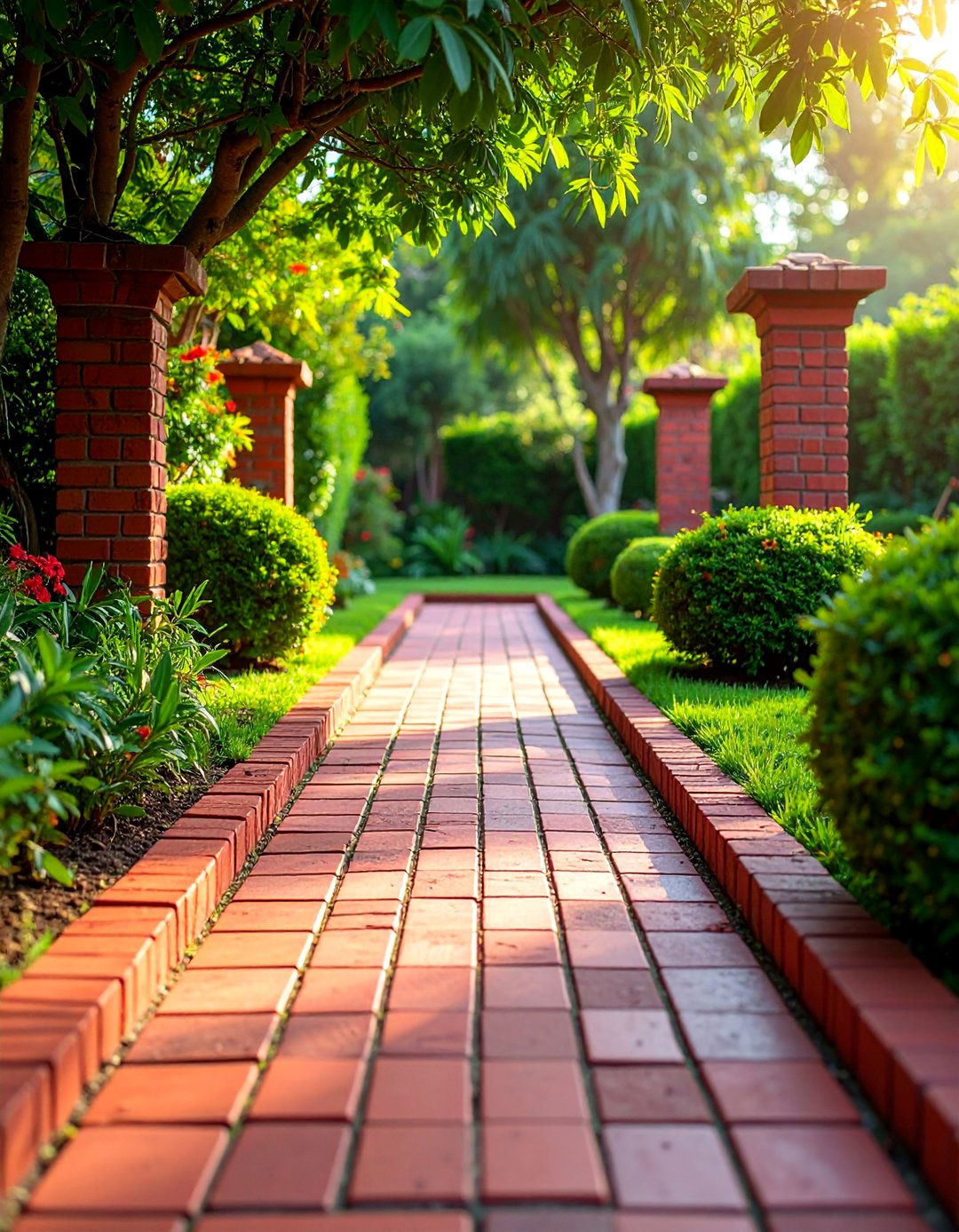
Traditional brick borders combined with central stone elements create structured walkways with classic appeal and defined edges. This hybrid design uses brick soldiers or stretchers to form precise pathway boundaries while featuring stone materials in center sections. The contrast between manufactured brick uniformity and natural stone variation creates appealing visual balance. Brick borders provide structural support and clean lines while stones offer natural beauty and texture variation. Installation requires careful coordination between materials to ensure proper heights and drainage. This design works well for colonial homes, traditional gardens, and landscapes where formal structure combined with natural elements creates desired aesthetic balance.
15. Decomposed Granite Stone Accent Path
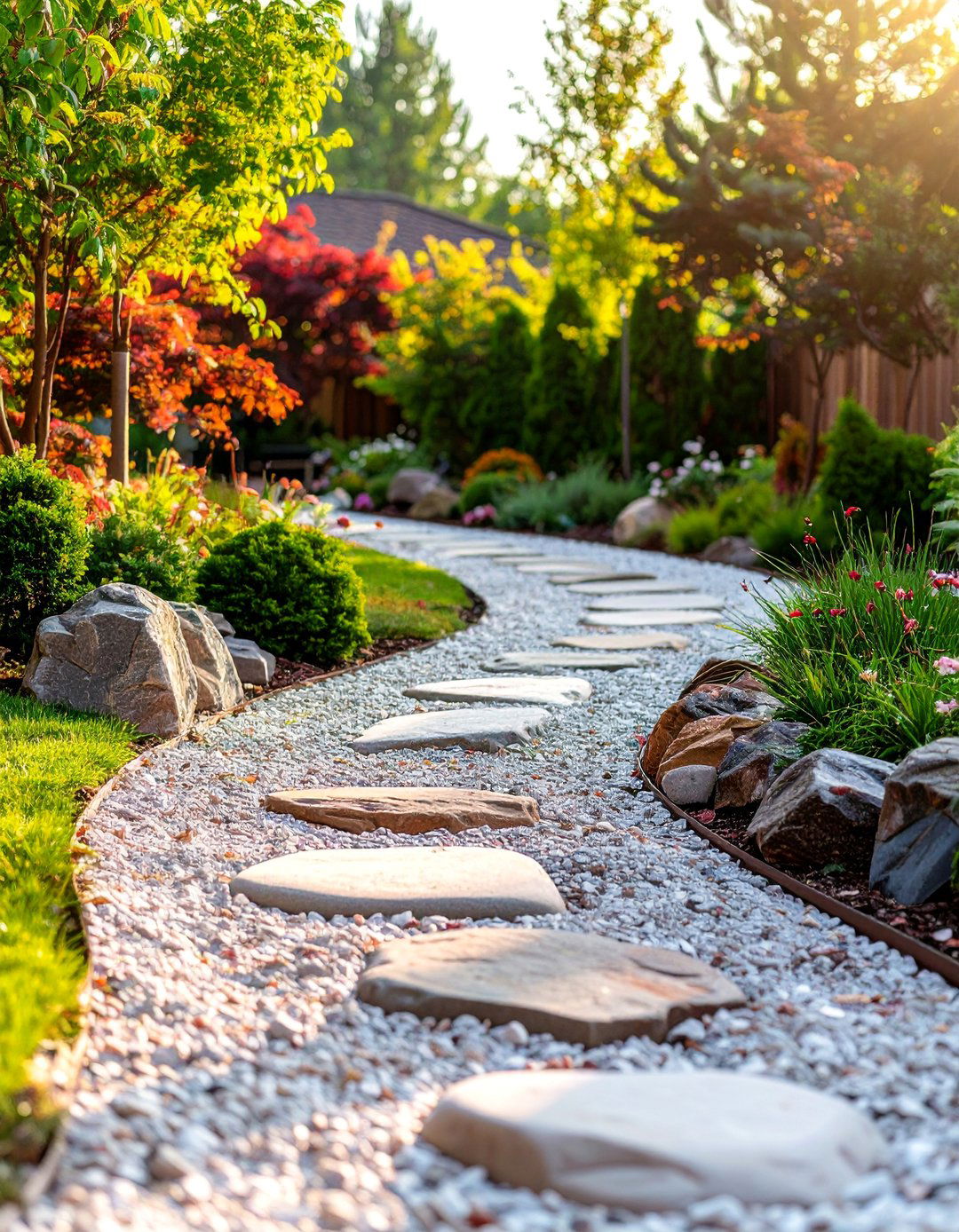
Stabilized decomposed granite pathways with strategic stone accents provide natural-looking, budget-conscious walkway solutions. This earth-friendly design uses decomposed granite as primary surface material with larger stones placed for visual interest and stepping surfaces. The fine granite particles compact into stable walking surfaces while maintaining natural appearance and excellent drainage. Stone accents can be arranged in patterns, used as focal points, or placed for functional stepping areas. Installation involves proper base preparation and compaction techniques to ensure long-term stability. This design suits informal gardens, drought-tolerant landscapes, and areas requiring permeable surfaces that support sustainable landscape practices.
16. Slate Crazy Paving Informal Style
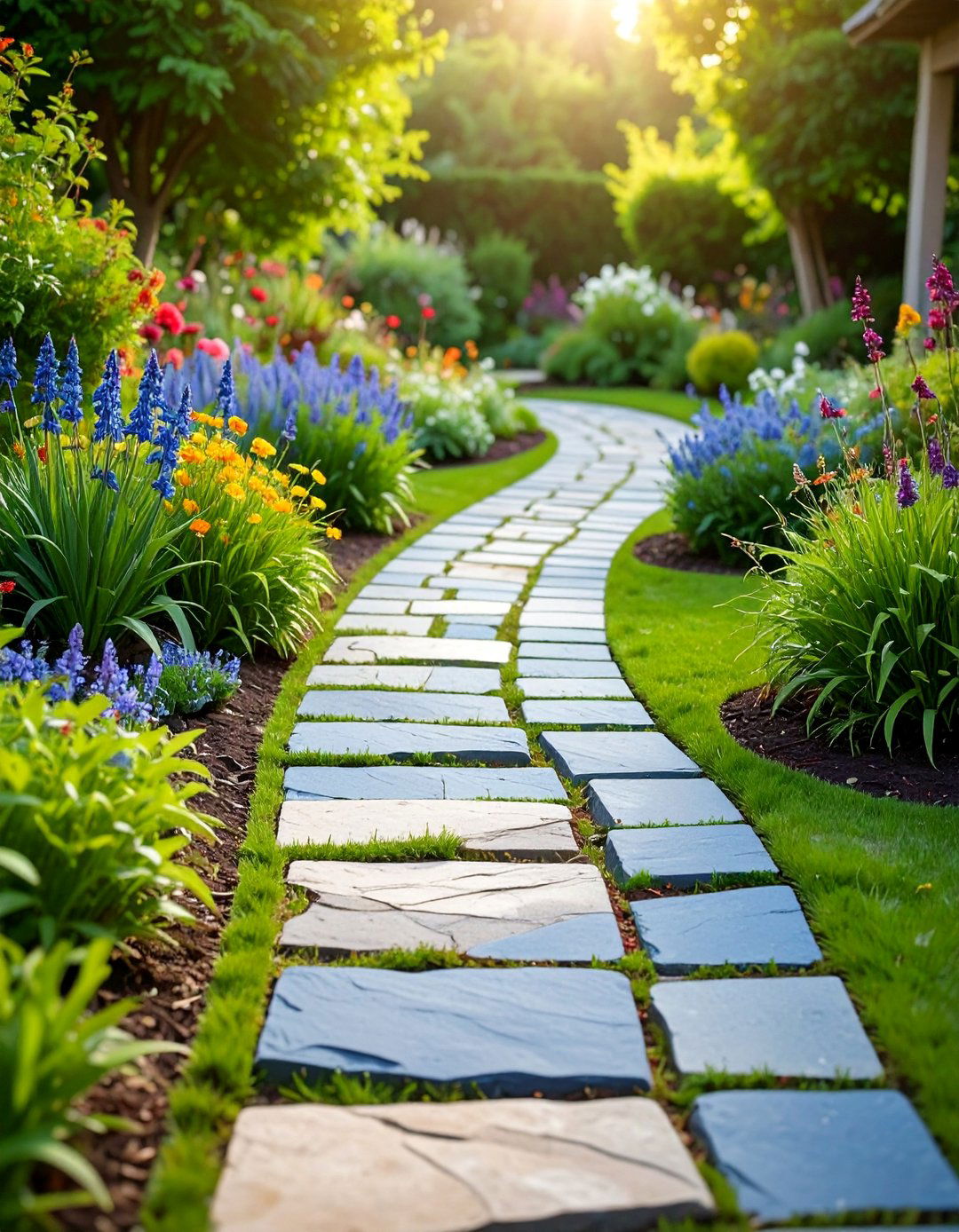
Irregular slate pieces arranged in crazy paving patterns create charming, cottage-style walkways with artistic flair. This informal design uses slate offcuts and irregular pieces fitted together like puzzle pieces, creating unique patterns that cannot be replicated. The varied shapes and natural cleft surface of slate provide excellent texture and visual interest while maintaining practical functionality. Joints between stones can be pointed with mortar or filled with smaller stone chips depending on desired formality level. Installation requires patience and artistic eye to achieve pleasing compositions. This design works beautifully in cottage gardens, informal landscapes, and areas where handcrafted, one-of-a-kind appearance is desired.
17. Large Format Porcelain Paver Modern Path
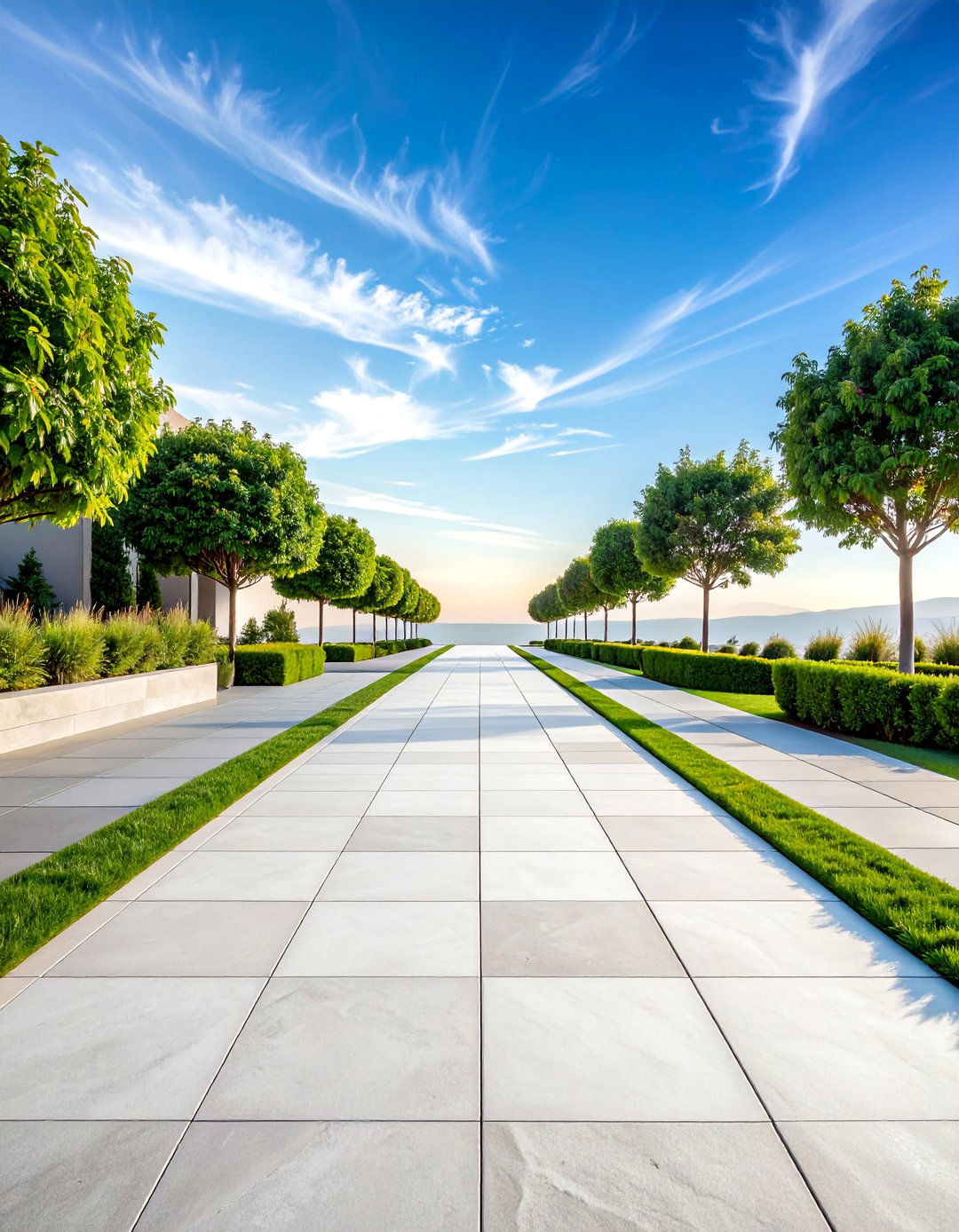
Contemporary large-format porcelain pavers create ultra-modern walkways with minimal joints and sleek appearance. This cutting-edge design uses oversized porcelain tiles that mimic natural stone while offering superior durability and consistent coloring. The large format reduces joint lines, creating smooth, uninterrupted surfaces that emphasize modern minimalism. Porcelain's non-porous surface requires no sealing and maintains consistent appearance regardless of weather conditions. Installation requires professional techniques and proper substrate preparation to support large tile formats. This design perfectly complements contemporary architecture, modern landscape designs, and outdoor spaces where low-maintenance, high-performance surfaces are prioritized over natural material authenticity.
18. Stacked Stone Raised Walkway Design
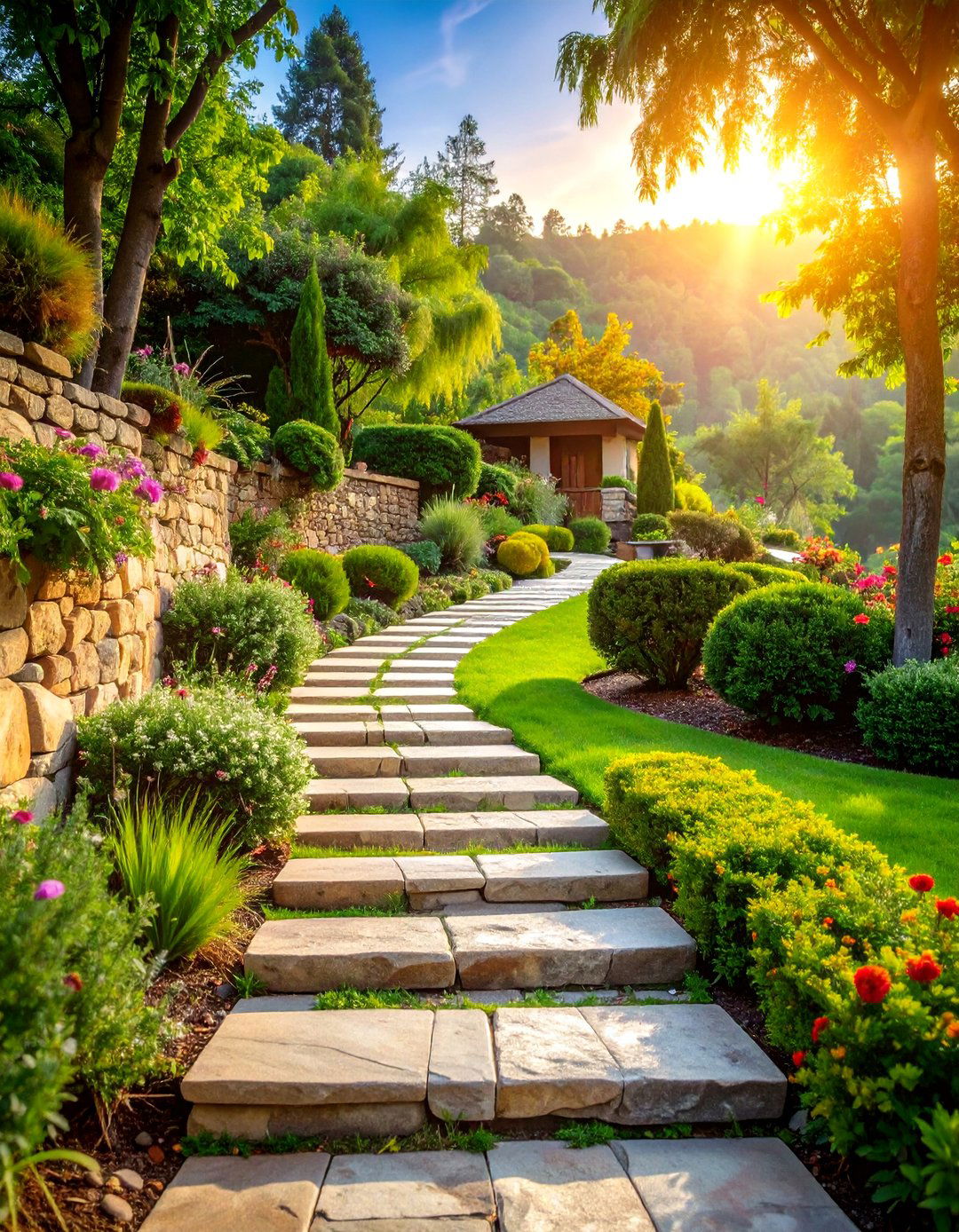
Elevated walkways using stacked stone construction create dimensional pathways that add architectural interest to sloped landscapes. This sophisticated design builds walking surfaces above grade using stacked stone walls or raised planters that define pathway edges. The elevation change creates visual drama while solving drainage issues and accommodating site topography. Stacked stone elements can incorporate integrated lighting, built-in planters, and seating areas. Installation requires structural engineering consideration for retaining wall stability and proper drainage systems. This design works exceptionally well for hillside properties, formal gardens, and landscapes where creating level walking surfaces while managing elevation changes is necessary.
19. Permeable Stone Grid Eco-Friendly Path
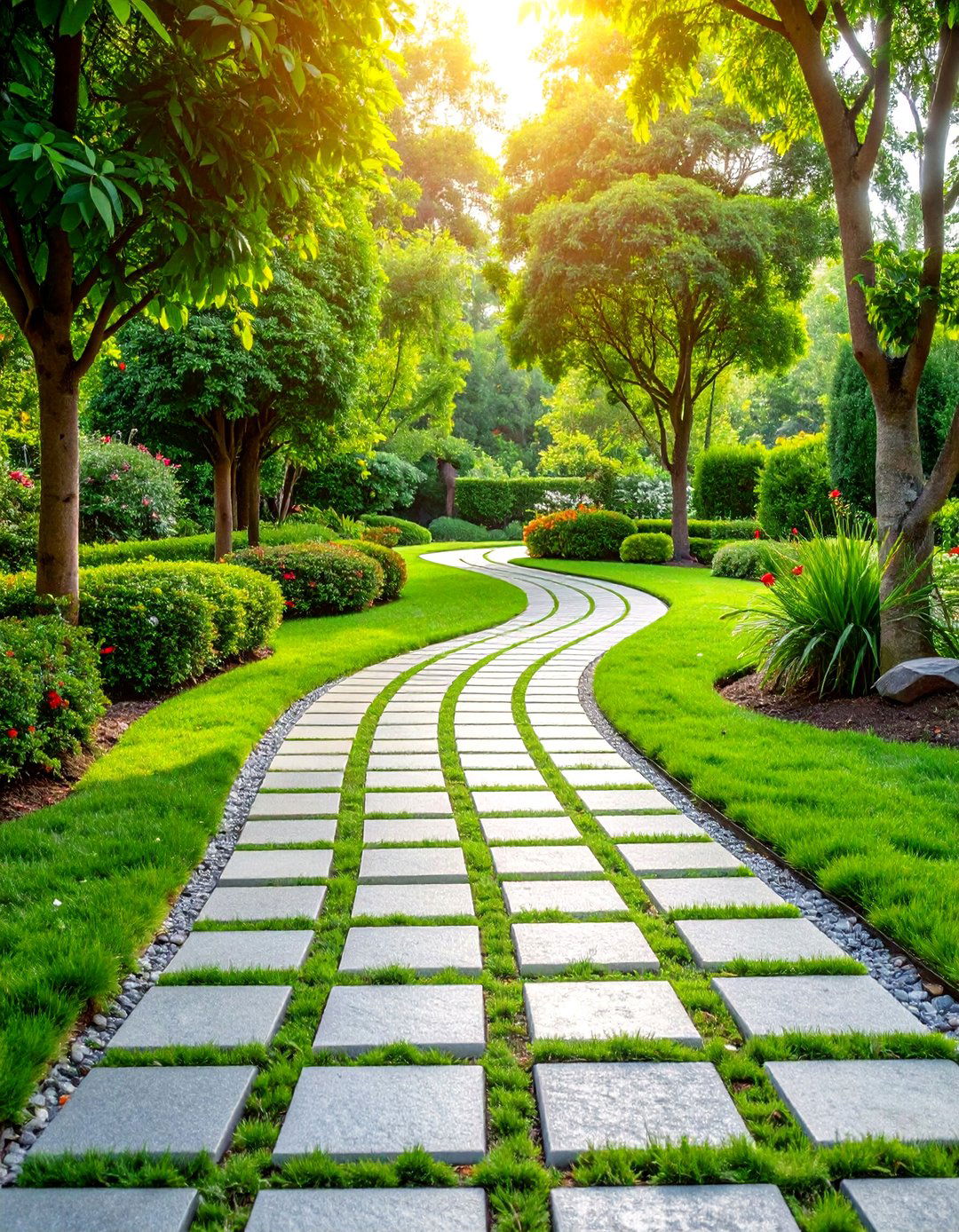
Environmentally conscious permeable stone systems create sustainable walkways that manage stormwater while providing stable walking surfaces. This green design uses specially designed stone units with built-in drainage systems that allow water infiltration while supporting pedestrian traffic. The permeable construction reduces runoff, recharges groundwater, and meets sustainable landscape requirements. Stone materials range from recycled aggregates to locally sourced options that minimize environmental impact. Installation follows specific base preparation and drainage requirements to ensure proper function. This design suits environmentally sensitive areas, LEED-certified projects, and properties where sustainable practices are prioritized without sacrificing functionality or aesthetic appeal.
20. Reclaimed Stone Historic Recreation Path

Salvaged and reclaimed stones create historically authentic walkways that preserve architectural heritage while providing functional pathways. This sustainable design uses materials recovered from old buildings, walls, or previous landscape installations to create pathways with genuine aged character. Each reclaimed stone carries unique weathering patterns and historical significance that cannot be replicated with new materials. The varied colors, textures, and sizes reflect authentic aging and use patterns. Installation may require additional preparation to accommodate varying stone conditions and sizes. This design perfectly suits historic properties, restoration projects, and landscapes where authentic period character and environmental responsibility are equally important considerations.
21. Japanese Inspired Stone Garden Path

Zen-influenced stone arrangements create meditative walkways that emphasize natural harmony and peaceful progression through landscape spaces. This contemplative design uses carefully selected stones in asymmetrical but balanced arrangements that follow Japanese garden principles. Elements include stepping stones across raked gravel, boulder accents, and precisely placed pathway stones that encourage mindful walking. The design emphasizes negative space, natural materials, and subtle color palettes that promote tranquility. Installation requires understanding of Japanese design principles and careful attention to stone placement and spacing. This design creates perfect meditation gardens, quiet retreat areas, and landscapes where spiritual connection with nature is desired.
22. Curved Stone Path with Integrated Lighting

Gently curving stone pathways with integrated lighting systems create magical evening walkways that provide safety and ambiance. This sophisticated design incorporates LED strip lights, recessed fixtures, or solar-powered elements directly into stone installations. The curved layout creates mystery and visual interest while lighting ensures safe navigation during evening hours. Light placement can highlight stone textures, create dramatic shadows, or provide subtle guidance illumination. Installation requires coordination between electrical systems and stone work, including proper waterproofing and drainage considerations. This design works beautifully for entertaining areas, romantic garden settings, and pathways where evening use and aesthetic impact are equally important.
23. Stone Medallion Feature Entrance
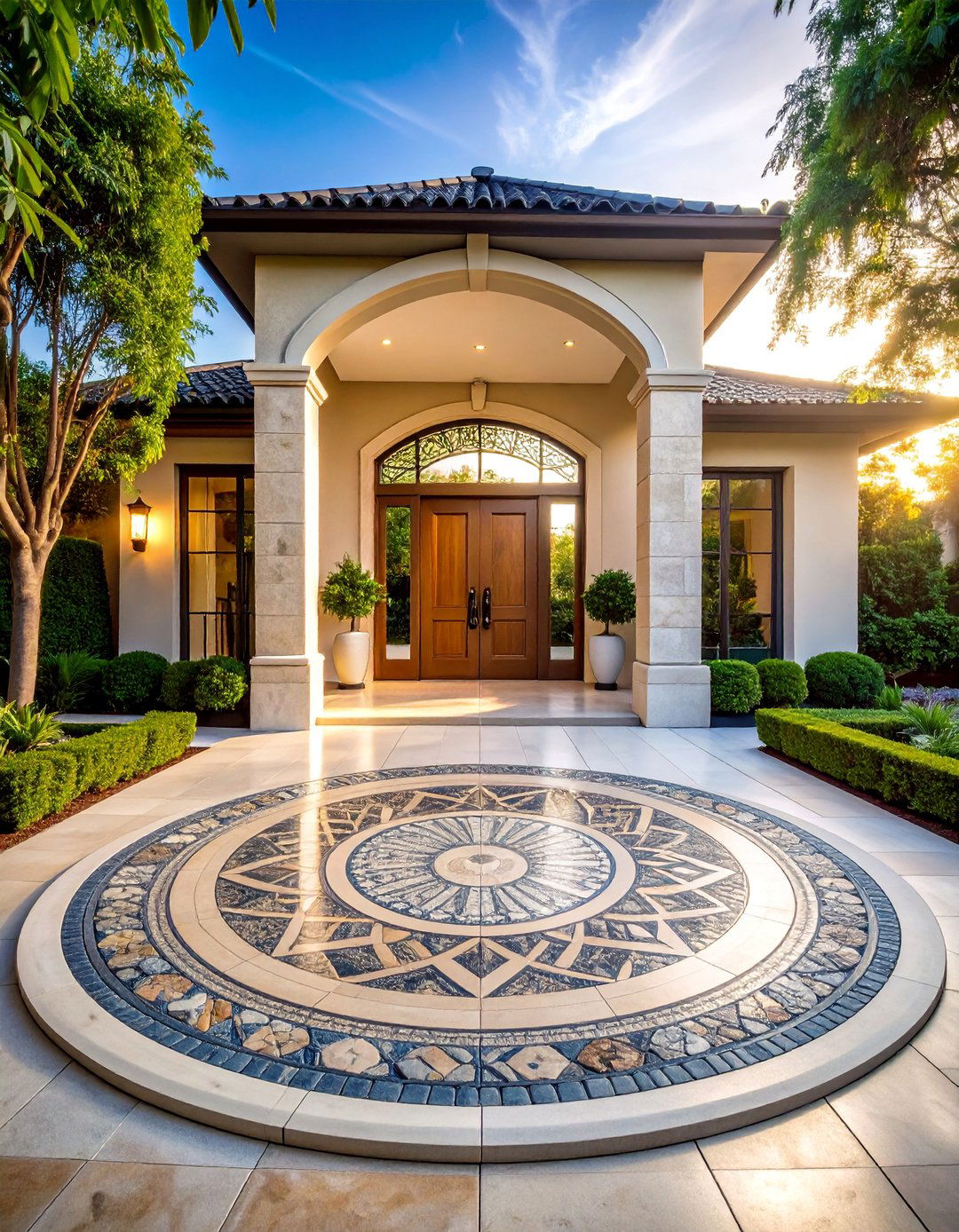
Decorative stone medallions create impressive entrance features that announce arrival while providing functional walkway surfaces. This formal design incorporates circular, square, or custom-shaped medallion patterns using contrasting stone materials that create focal points within larger pathway systems. Medallions can feature family crests, geometric patterns, or artistic designs that reflect personal style. The surrounding pathway materials complement medallion designs while providing practical walking surfaces. Installation requires precise measurement, cutting, and fitting to achieve professional results. This design suits grand entrances, formal landscapes, and properties where creating memorable first impressions through distinctive hardscape features is important.
24. Tiered Stone Steps Walkway

Multi-level stone steps create graceful transitions through sloped landscapes while providing comfortable walking surfaces on challenging terrain. This functional design uses natural stone materials to build series of steps, landings, and terraced walkways that follow site topography. Each level can incorporate different stone sizes, patterns, or materials while maintaining overall design cohesion. Proper drainage, structural support, and safety considerations are essential for long-term performance. Installation requires professional expertise in grading, structural support, and stone work. This design works perfectly for hillside properties, sloped entrances, and landscapes where managing elevation changes while maintaining elegant appearance is necessary.
25. Contemporary Steel Edge Stone Path
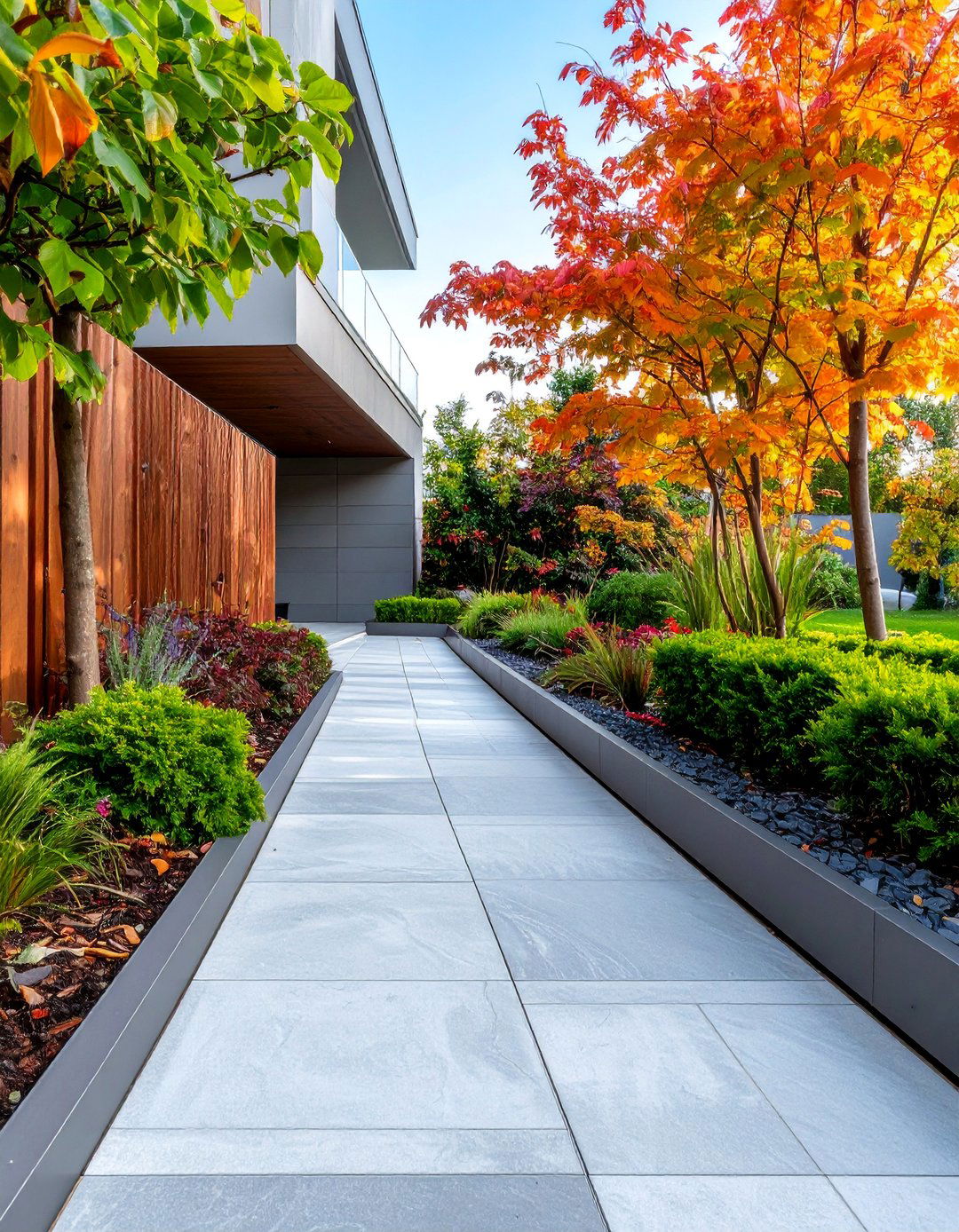
Modern steel edging combined with stone surfaces creates crisp, architectural walkways that emphasize clean lines and material contrast. This urban design uses weathering steel, stainless steel, or powder-coated metal edges to define precise pathway boundaries while stone materials provide walking surfaces. The metal edging creates perfect straight lines or gentle curves while containing stone materials and preventing edge deterioration. The contrast between industrial metal and natural stone creates striking contemporary aesthetics. Installation requires professional metal work and proper drainage considerations. This design perfectly complements modern architecture, urban landscapes, and outdoor spaces where architectural precision and contemporary materials are desired.
Conclusion:
Stone walkways offer endless opportunities to enhance your outdoor spaces with both beauty and functionality. From traditional flagstone paths to contemporary geometric designs, each approach brings unique character while serving practical needs. The key to successful stone walkway design lies in selecting materials and patterns that complement your home's architecture and landscape style. Whether you choose natural river rock mosaics, elegant limestone ashlar patterns, or modern steel-edged contemporary paths, proper installation ensures lasting beauty and performance. Consider factors like drainage, maintenance requirements, and climate conditions when making your selection to create walkways that will be enjoyed for years to come.


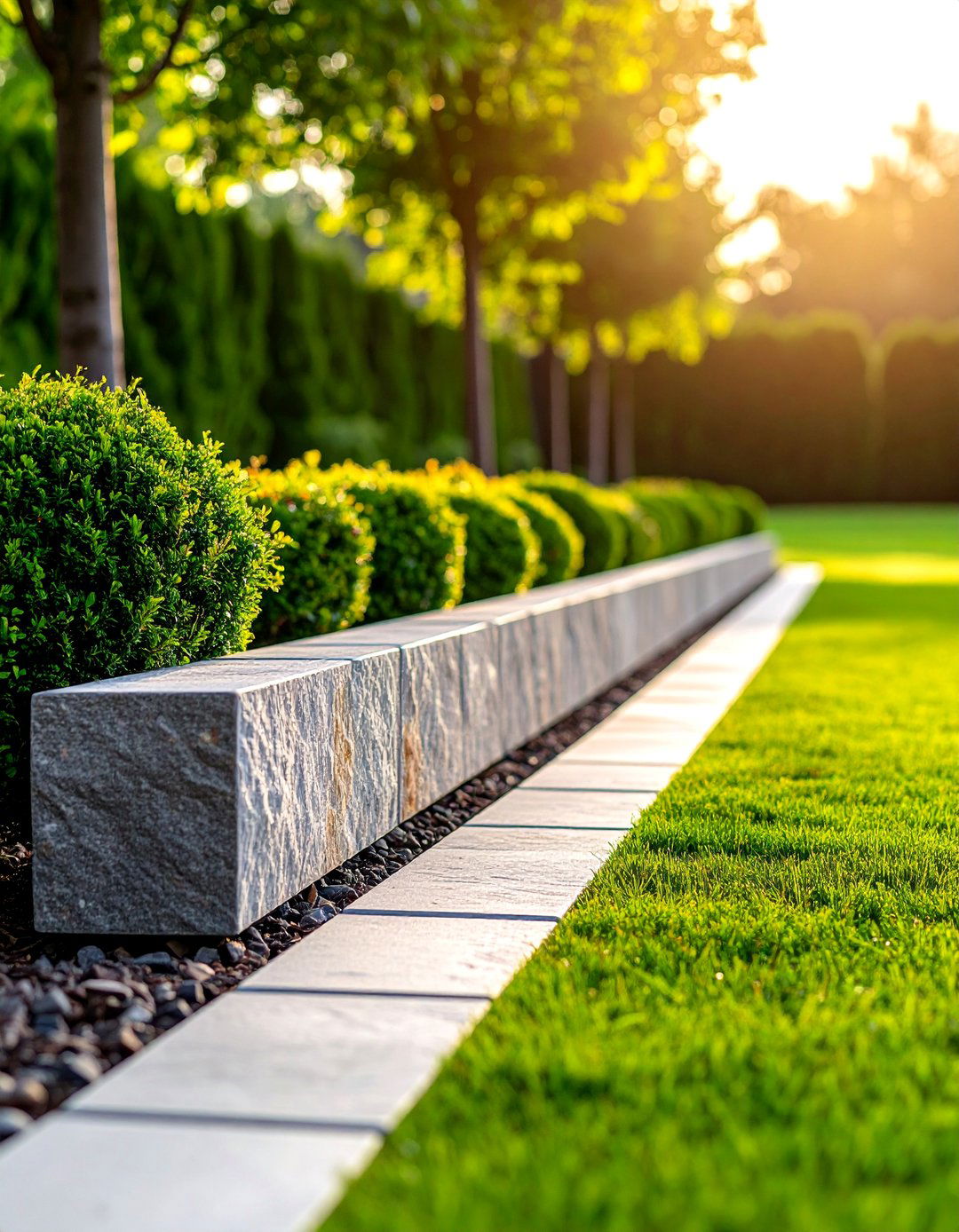

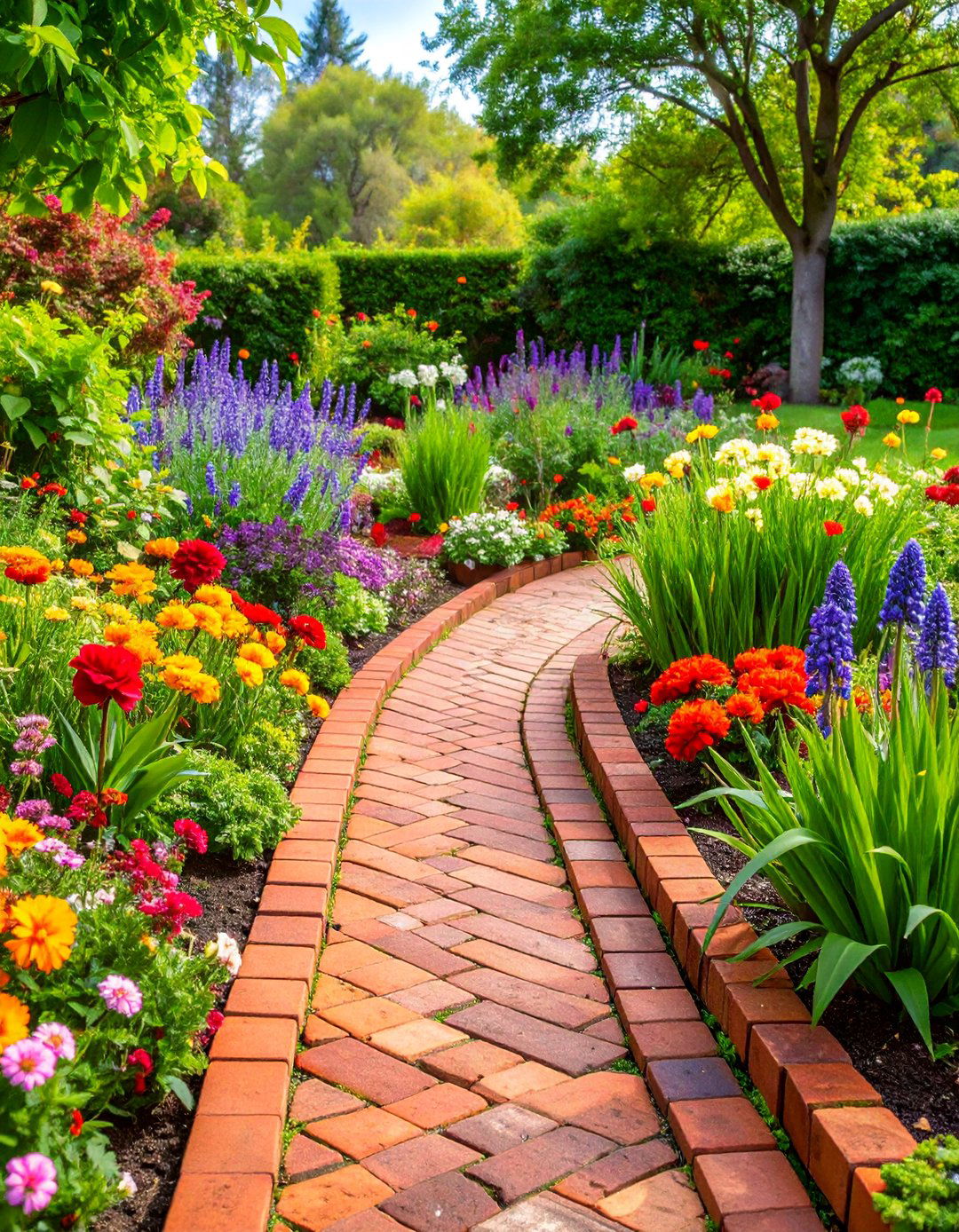
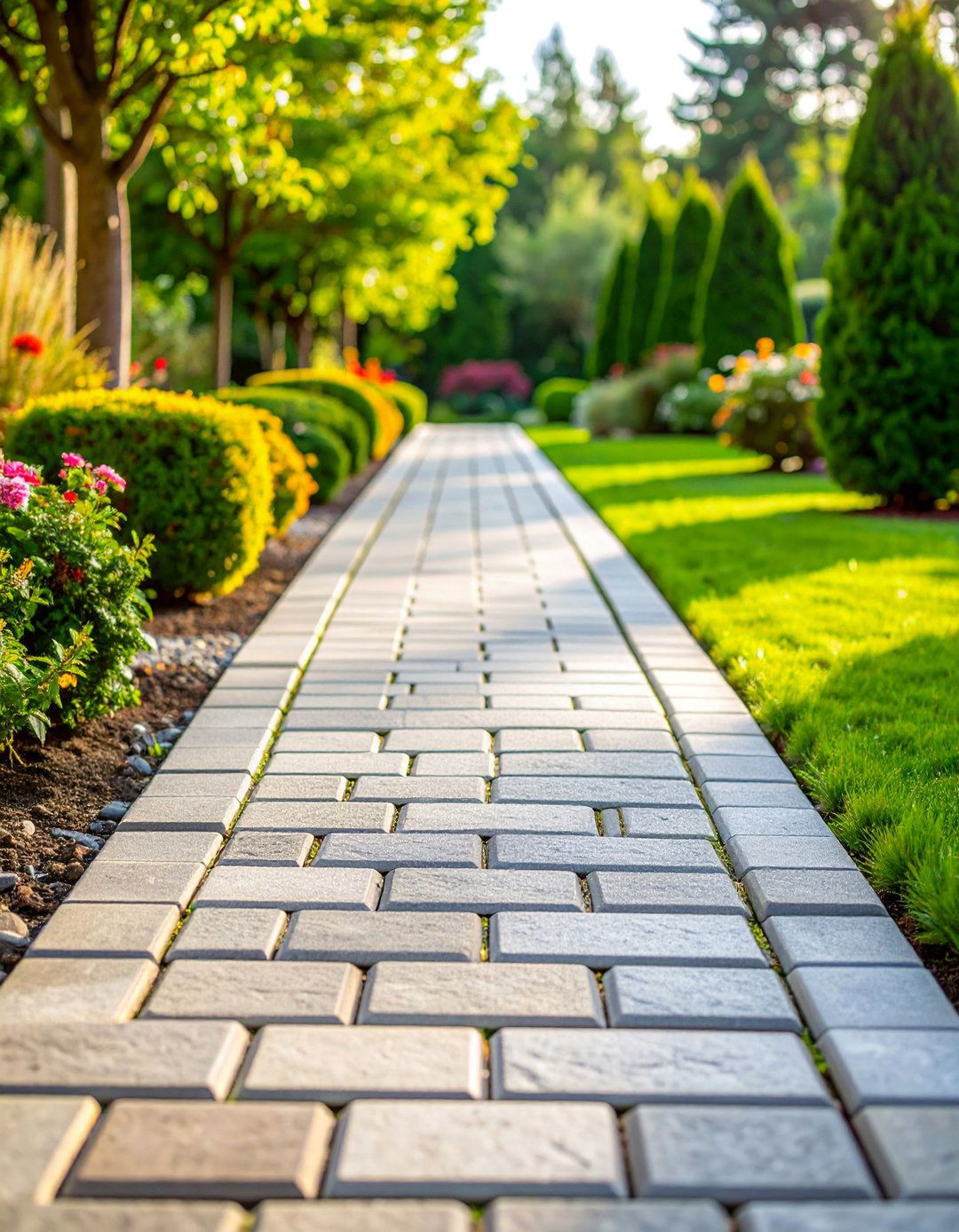
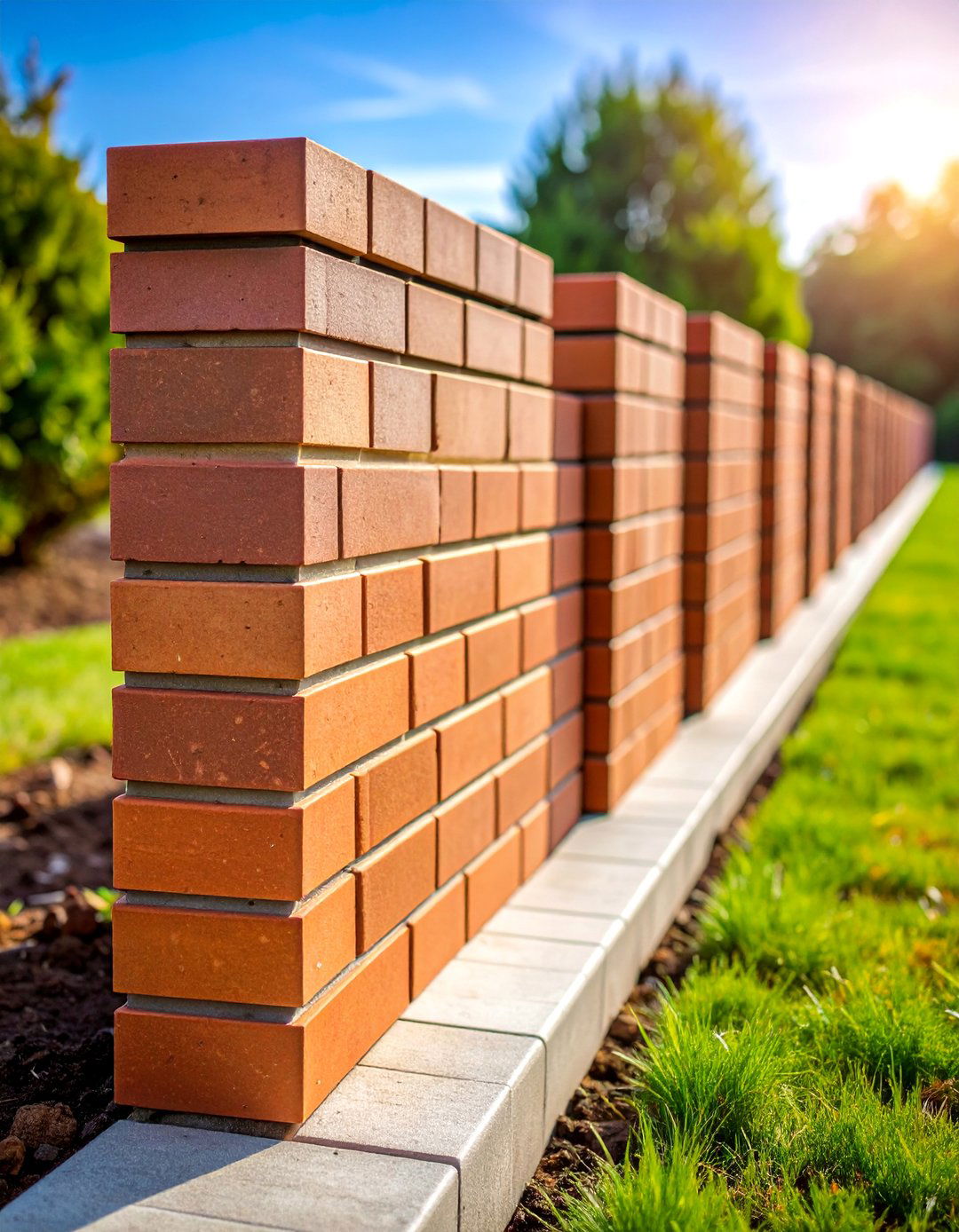


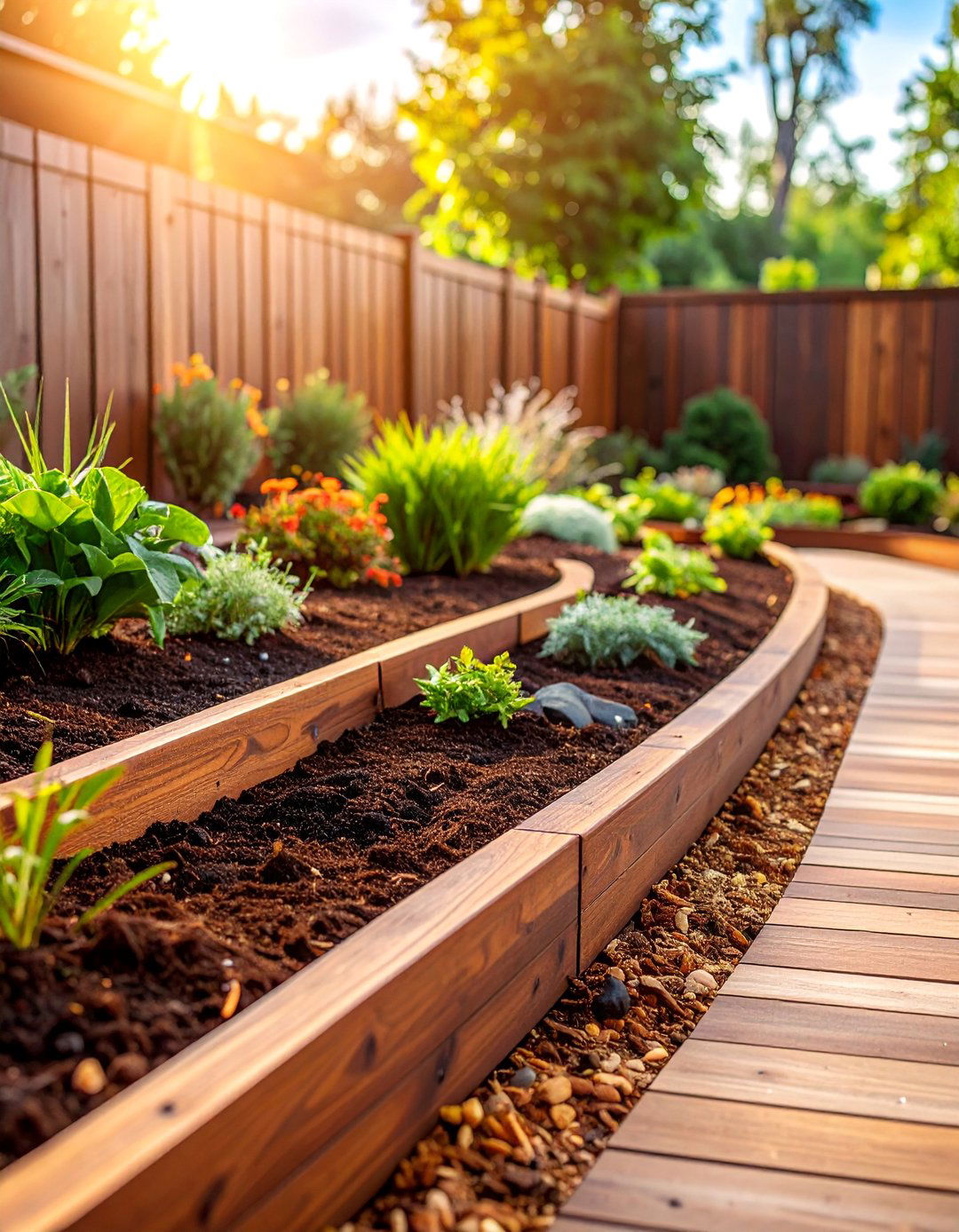
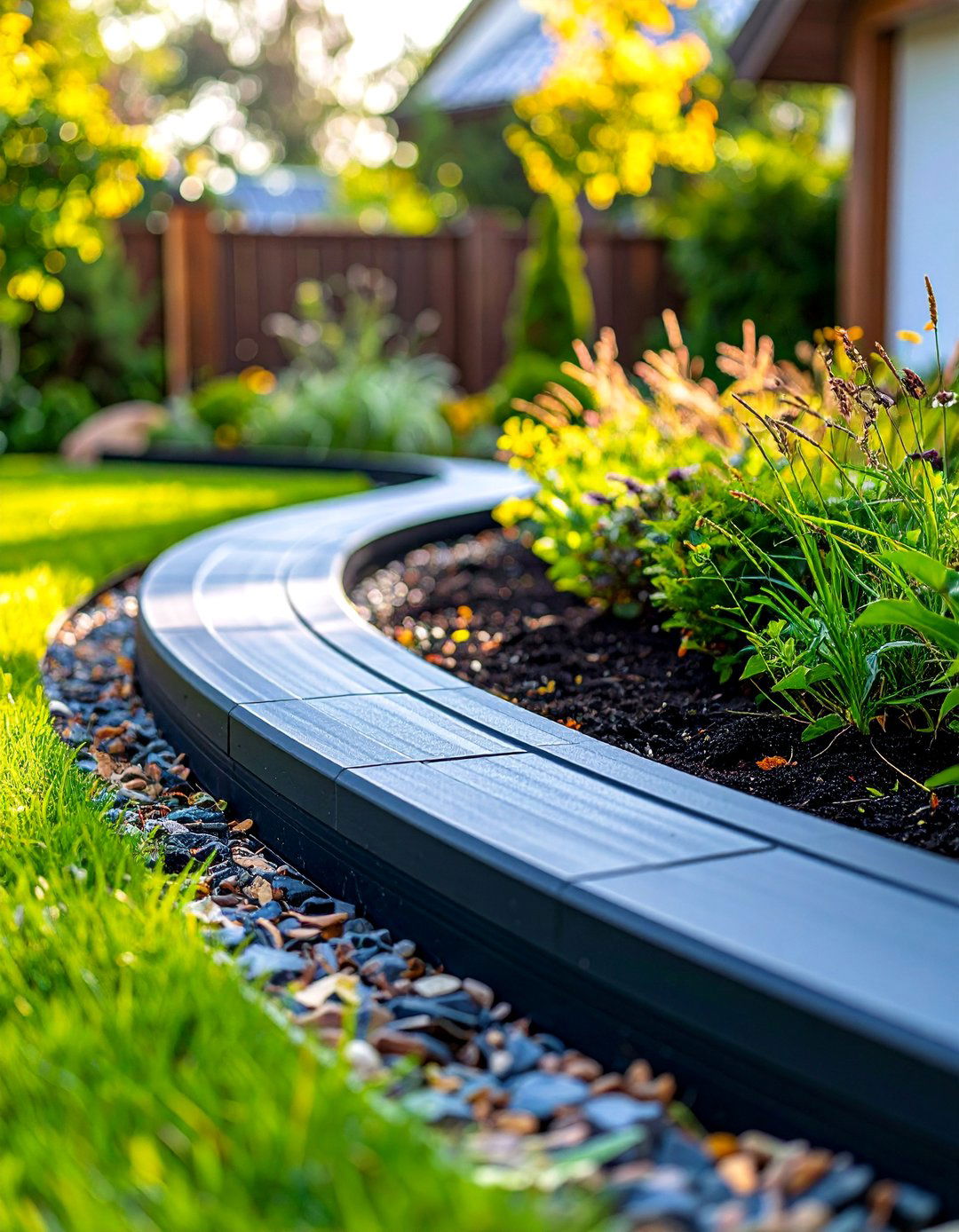
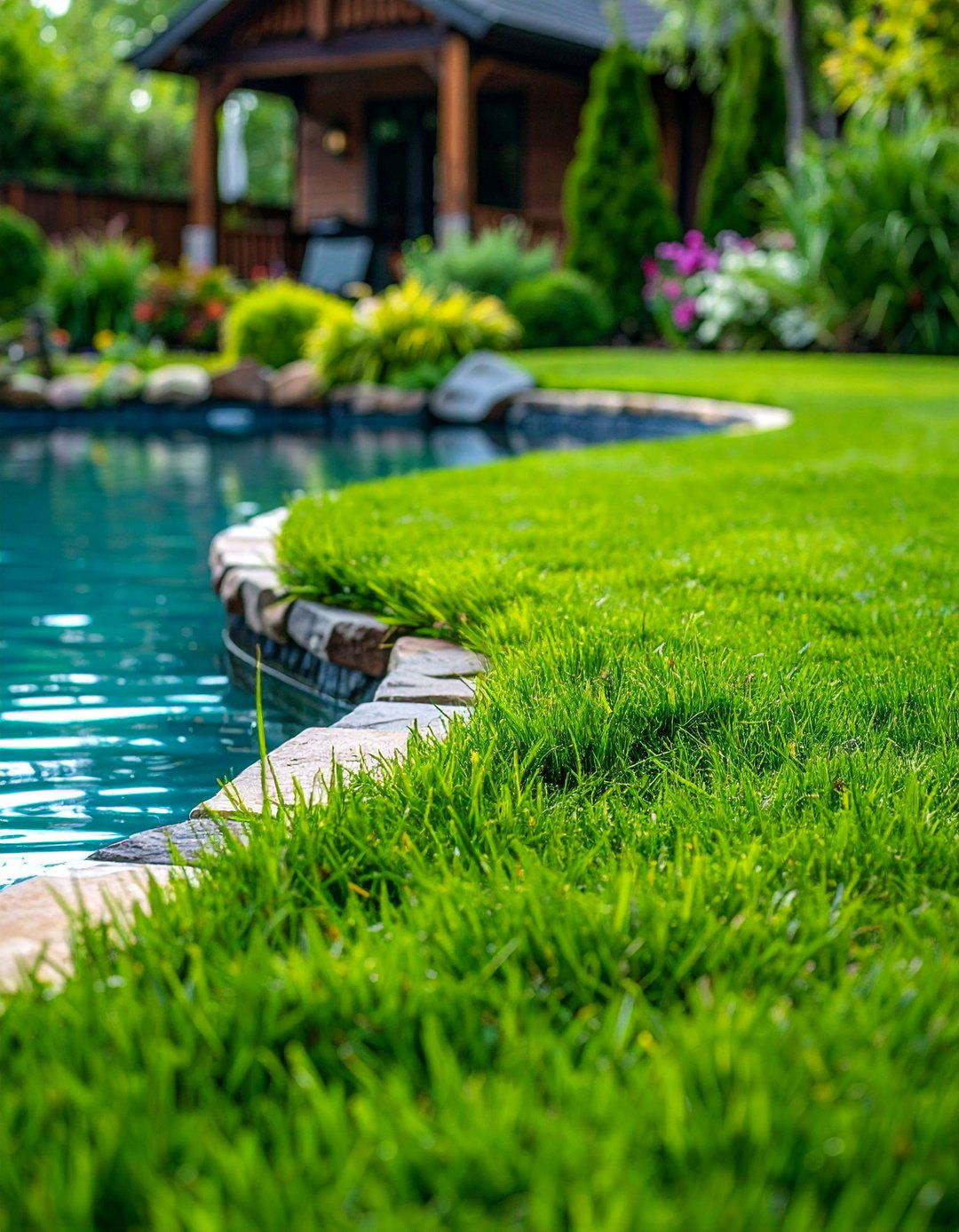
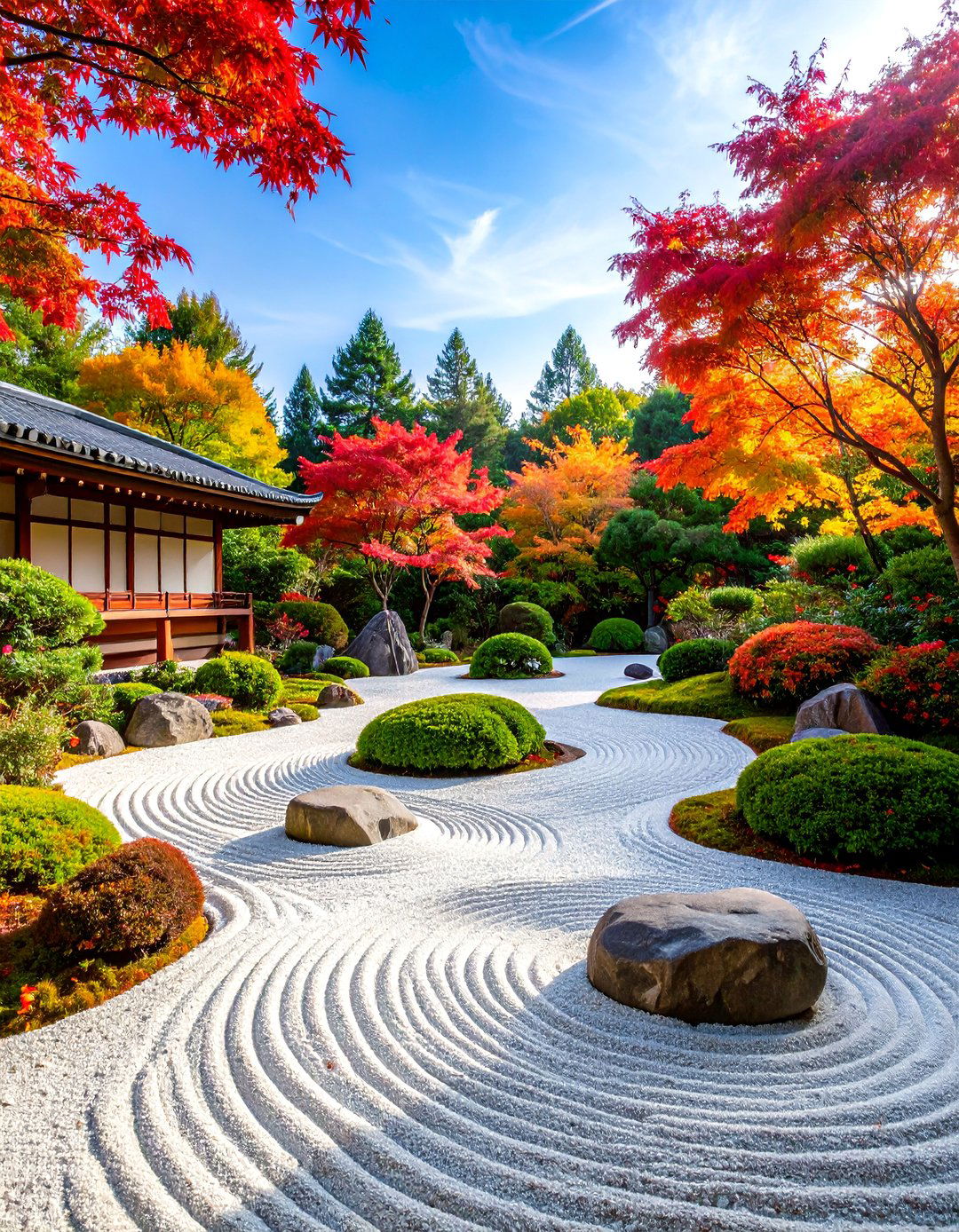
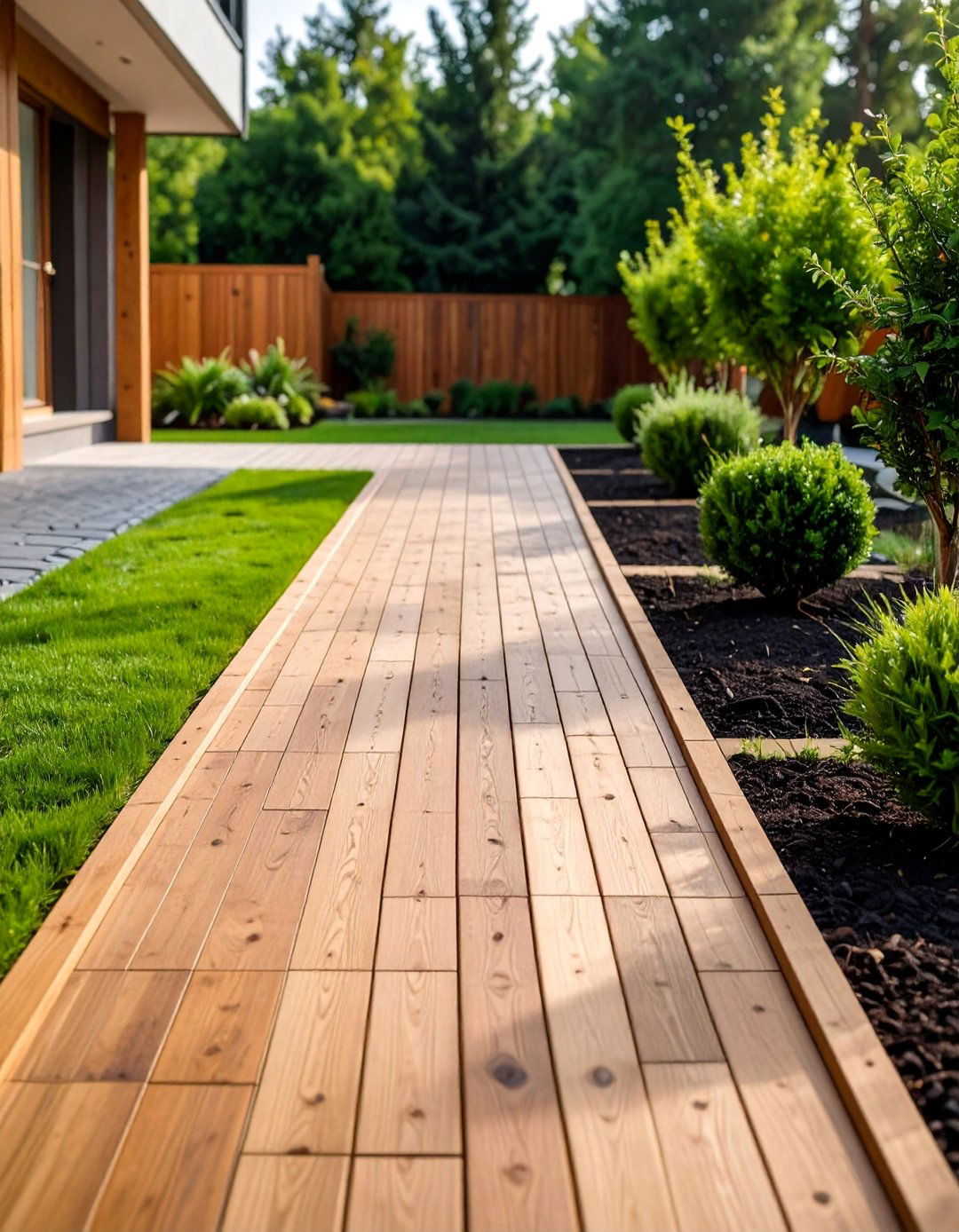
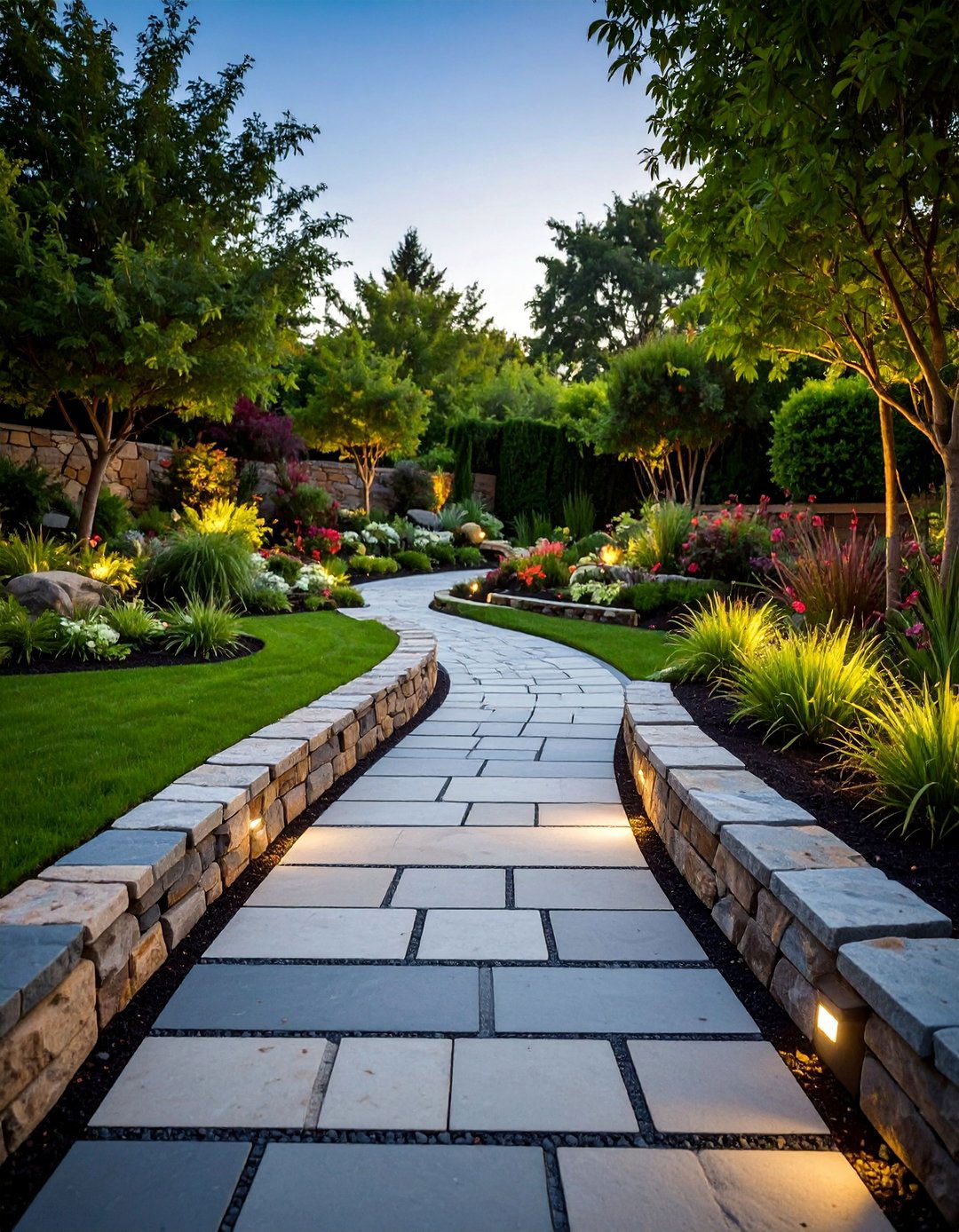


Leave a Reply